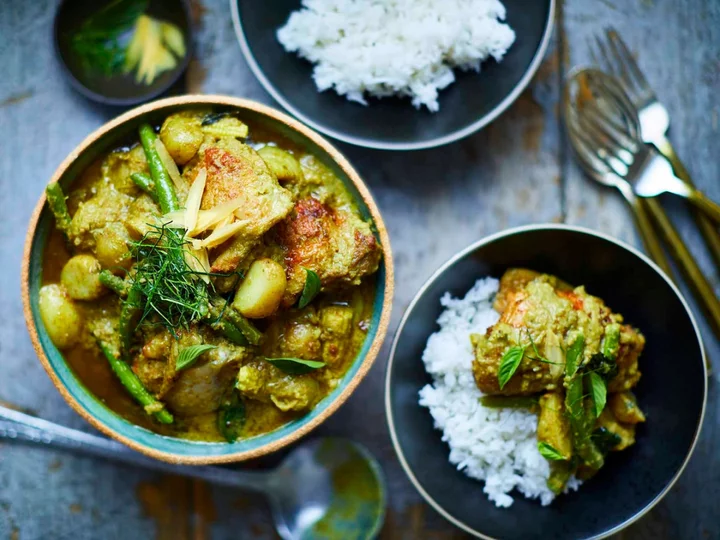
Three barbecue recipes to try that aren’t burgers
We all love a good barbecue but sometimes we want something a little more than overcooked burgers and soggy salads. There’s no reason you can’t be adventurous when cooking al fresco, says Farang chef Sebby Holmes. When cooking chicken over a fierce heat, for example, it’s always best to marinate or brine it first. That’s what makes the chicken green curry below so packed full of goodness by the time it hits the barbecue. The same goes for the grilled tiger prawns and citrus som tam salad. A widely eaten salad in Asia, the som tam’s clementine adds a natural sweetness to the juices of the grilled prawns, making this a stand out dish. When cooked over an open fire, aubergine has an amazing ability to transform into a smoky, soft bombshell of flavour. The smoky aubergine, pickled cucumber and sesame salad with runny duck eggs is the perfect accompaniment to a barbecue, and also delicious served with steamed rice as a main. Barbecue chicken green curry When cooking chicken over a fierce heat such as a barbecue, it’s always best to marinate or brine it first. Now, you can honestly spend a lifetime researching the brining process and some people do, however we don’t have time for that! Suffice to say that by leaving raw meat in contact with salt and/or sugar and moisture before cooking, you allow it to take on flavour. This recipe uses the green curry paste to marinate the chicken, meaning it’s packed full of goodness by the time it hits the barbecue. Serves: 2 Ingredients: 20g coconut oil (vegetable oil can also be used instead) 100g green curry Payst 3g kaffir lime leaves, torn a little to release their flavour 10ml fish sauce (if using Payst no seasoning is necessary as it is pre-seasoned) 10-15g palm sugar (if using Payst no seasoning is necessary as it is pre-seasoned) 200ml chicken stock 1 tin coconut cream 4 free-range chicken thighs on the bone (400-600g total weight) 100g new potatoes, sliced in half 80g baby sweetcorn, sliced at an angle 80g green beans, sliced in half lengthways 10g krachai wild ginger, peeled and julienned (if you can’t find this, use the larger, more common ginger) 10g Thai sweet basil A piece of wood for smoking on the BBQ (my favourite is hickory) Method: Heat the coconut oil in a large saucepan over a high heat, then add the green curry paste and kaffir lime leaves and stir regularly until the paste begins to split like scrambled eggs – this will take a few minutes. You will notice that the smell of the ingredients changes from raw to fragrant. At this point, add 10ml fish sauce and allow it to cook into the paste for 1 minute (don’t add too much as it is strong and you can always add, but never take away). Next, add the sugar and cook for a minute or so until melted and beginning to caramelise – this is noticeable as the paste begins to darken. Now it’s time to loosen the curry with liquids. Add half the chicken stock and 100ml of the coconut cream to the pan, then remove from the heat and allow to cool. When cool, use a little of the curry to marinate the chicken thighs; use enough to coat them, then refrigerate the chicken to allow the flavours to infuse for a minimum of 2 hours, but ideally overnight. Light the barbecue and wait for the coals to glow red. Place the piece of wood onto the coals and allow to set alight and begin to smoke. At this point, add the chicken thighs skin-side up and cook for 3-4 minutes on one side, lowering the BBQ lid so that the meat is engulfed by the smoke. Turn the chicken pieces over and repeat the process until the skin is crispy and golden brown and the chicken is piping hot. Next, return the remaining green curry to the pan and bring back to a simmer. Add any excess from the marinated chicken, then add the remaining stock. Add the potatoes and cook for about 8 minutes until they begin to soften. Add the sweetcorn and green beans and cook for a further 5 minutes until all the vegetables are softened but still retain a little bite. Add the hot chicken thighs, the remaining coconut cream and the krachai and basil. Check you are happy with the seasoning, add a little more fish sauce, sugar or coconut milk if needed and serve immediately. This dish is best served with steamed jasmine rice. Grilled tiger prawns and citrus som tam salad Som tam has fast become one of the most widely eaten and popular salads to come out of Asia. It originates from Lao, but now has many well-known variations from all over. This version is one I created for Farang. The use of clementine, which adds a natural sweetness, along with the juices of the grilled prawns, makes it a stand out dish. Try it with some sticky rice and some of our ginger and green sweet chilli dipping sauce for a proper feed. Serves: 2 Ingredients: 8-10 prawns, cleaned, deveined and outer shells removed 1 tsp fish sauce 1 tsp vegetable oil 4 garlic cloves, peeled 2 tsp dried shrimp A pinch of Maldon sea salt 1 tbsp peanuts, fried or roasted 3 red bird’s-eye chillies (more if you like it spicy) 10g green beans, chopped in 2 30g cherry tomatoes 200g shredded green papaya (can be found in most Asian supermarkets) 10-15g palm sugar 20ml thick tamarind water Juice of 2 limes ½ lime, chopped with the zest on Juice of 1 clementines Method: Coat the prawns in the fish sauce and oil, then place them on a hot grill for 2-3 minutes until the side in contact with the heat has turned pink. Turn the prawns over and repeat on the other side until they are hot throughout. Remove from the heat and set aside. Pound the garlic and dried shrimp in a mortar and pestle, using the salt as an abrasive. Then pound in the peanuts to break them up just enough to mix through the salad; be careful not to over-pound them or they will turn into peanut butter. Next, one by one, add the chillies, green beans, tomatoes, grilled prawns and papaya to the mortar, bruising them as you go to distribute the flavours. Add the palm sugar, tamarind water, lime juice, chopped lime and the juice of 1 clementine. Give the salad a final bruising to ensure that all ingredients are packed full of the flavoursome dressing, making sure that the palm sugar has completely dissolved in the dressing, otherwise someone will get an unexpected sweet mouthful. Taste the dressing to check that it suits your tastes – it should be sweet, salty, sour and spicy with a hint of bitterness from the lime zest. Adjust the seasoning if necessary, then serve. Smoky aubergines, pickled cucumber and sesame salad with runny duck eggs When cooked over an open fire, aubergine has an amazing ability to transform into a smoky, soft bombshell of flavour. This salad, a perfect accompaniment to a barbecue and also delicious served with steamed jasmine rice as a main, uses a runny egg to contribute to the dressing. I’ve used Thai purple aubergines, which are thinner and easier to grill evenly in a short time. You can also use ordinary aubergines, but they may need a little longer on the fire. Serve drizzled in our burnt chilli dipping sauce to add an extra level of flavour. Serves: 2 Ingredients: 4 Thai purple aubergines (these can be found in most Asian supermarket, however, the larger, more popular, aubergines can be used instead) 2 duck eggs 10g jasmine rice 10g mint, torn 10g coriander 10g Thai shallots, peeled and thinly sliced (banana shallots can be used) 1 tsp toasted sesame seeds For the pickle: 2 tbsp caster sugar ½ tsp table salt 50ml distilled white vinegar ¼ cucumber, thinly sliced For the dressing: Juice of 3 limes Juice of 2 clementine 2 tsp fish sauce (seaweed sauce can be used as a vegetarian substitute) ½ tsp chilli powder (a little less if you don’t like things too spicy) 2 tsp caster sugar 3 tsp tamarind water Method: Light the barbecue and place the whole aubergines directly onto the hot coals, or near the hottest part of the grill if you’re using a gas barbecue. Keep a close eye on them and turn them over frequently, ensuring that the heat from the coals is distributed evenly. The aubergines are ready when they are soft to the touch, with charred and blistered skins. When cool enough to handle, peel off the skin. If you are not using a barbecue, crank the oven right up to full blast and bake the aubergines until the skins are charred and the flesh is soft – this will take 20-25 minutes. Meanwhile, soft-boil then peel the duck eggs. An average-sized egg takes 6-7 minutes to cook on a rolling boil. I cook mine in salted water, then transfer them into ice-cold water with a splash of olive oil. If you peel the eggs in the water, the oil gets between the shell and the flesh, making them easier to peel. Once peeled, set aside at room temperature. Put the rice in a dry frying pan and lightly toast on a medium heat, shaking the pan constantly until the grains have turned golden brown and release a lovely aroma. Pound the rice into a powder in a granite mortar and pestle, or use a spice grinder. Make sure to grind the rice to a powder as it will be used to add texture to the salad; it will be crunchy if the grains are too coarse. Next, make the pickle. In a medium saucepan, gently heat the sugar, salt and vinegar together with 50ml cold water until the sugar has dissolved. Be sure to keep stirring so that the sugar dissolves without heating the water too much. Remove from the heat and add the cucumber, then refrigerate. Make the dressing. In a bowl, mix the lime and clementine juices, the fish sauce, chilli powder, sugar and tamarind water. Taste and adjust the dressing to cater to your own taste buds: it should be sweet, salty, sour and hot, with an edge towards the salt and citrus. When you’re happy with the flavour, add the aubergines, mint, coriander, shallots and the pickled cucumber (straining any pickling juices before adding), then gently fold together, leaving the aubergines whole if you can be delicate enough. Put the aubergines on a serving plate and place the duck eggs on top. Using the tip of a knife, pierce a hole in the eggs and break them open with your fingers, releasing the runny yolks so that they ooze into the salad. Sprinkle the salad with the rice and sesame seeds and add a tiny pinch of salt onto the runny egg yolks as a surprise burst of flavour. Serve with steamed jasmine rice for an extra fill.
2023-07-22 13:49
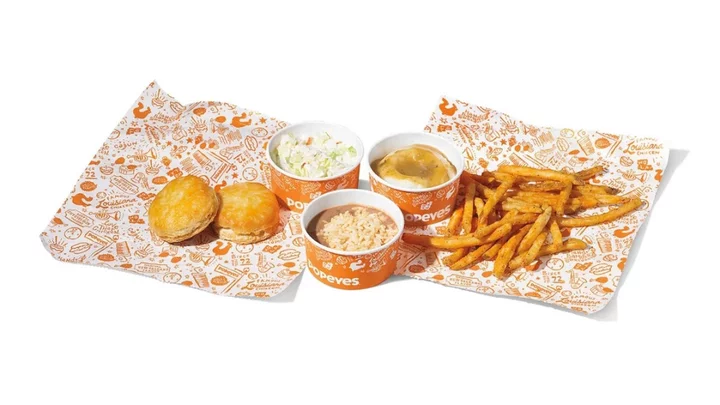
Popeyes widely mocked for attempt to join ‘girl dinner’ trend
The “girl dinner” trend is the newest viral sensation taking over TikTok. Now, Popeyes has unveiled its take on “girl dinner” by offering a variety of sides for a single meal. However, not everyone is on board with the new menu item. For those unaware, the “girl dinner” trend first popped up in May after TikTok user Olivia Maher described her ideal meal as nothing but bread and cheese. As Maher showed off her plate - which consisted of bread, cheese, wine, grapes, and pickles - she said: “This is my dinner, I call this ‘girl dinner.’” Since then, fellow TikTokers have used Maher’s sound to highlight their go-to “girl dinner” meals - green olives, salami slices, and pieces of cheese; guacamole and chips; or prosciutto and peach slices. Essentially, the “girl dinner” trend involves a smorgasbord of one’s favourite snacks or small plates, which is why it didn’t take long for Popeyes to unveil its own “girl dinner” menu. The American fast food chain, known for its iconic chicken sandwiches, is now selling a selection of six side dishes on its website under the new tab, “Girl Dinner”. The menu includes mashed potatoes, macaroni and cheese, Cajun fries, coleslaw, biscuits, and red beans with rice. Each dish has to be ordered separately, and the price varies depending on how many sides are ordered. In fact, the “Girl Dinner” tab is identical to Popeyes’ menu for side dishes, but just with a trendier name. That’s partly why Popeyes’ new “girl dinner” menu has sparked much conversation online: it’s all just sides. “Thought this was a joke but there is literally a ‘girl dinner’ section on the Popeyes website wtf is going on,” read one viral tweet. “Popeyes got a ‘girl dinner’ section on the app…but it’s just sides lol,” another said. “If anyone was wondering Popeyes has a ‘girl dinner’ segment of its menu and it’s just all their available sides,” a third user wrote. While some people believed the menu option was a “genius” marketing ploy, others pointed out its shortcomings – namely, that a restaurant known for its chicken wouldn’t offer chicken in its new menu. “To go to Popeyes and not get chicken is a literal crime give girl dinner some chicken plz,” said one user in response. Unlike a traditional combo meal, which combines a variety of offerings into one order, many people also noted that the “girl dinner” meal is exactly the same as Popeyes’ side dishes. “They didn’t actually do anything tho!!! It’s just sides, there isn’t a combo mix-n-match,” said one person on TikTok. “They duplicated the sides tab and renamed it ‘girl dinner.’” Much like the original “girl dinner” trend, which sparked some controversy for lacking sustenance, Popeyes fans believed that its new menu option was simply not enough food. “Popeyes is offering a ‘girl dinner’ menu that contains zero meals,” one person tweeted. “Just a quick reminder that it is girly and feminine as f*** to eat many big, nutritious meals a day.” In a statement to CNN, Popeyes said its “girl dinner” menu was designed to give its fans “options packed with robust Cajun flavours that are made with the same slow, time-honoured, homemade traditions of Southern cooking that the brand started in 1972”. Read More What is the ‘girl dinner’ trend and why is there controversy over it? What is an ‘ingredient household’? TikTok phrase for snackless homes goes viral ‘We call them Picky Bits’: Nigella Lawson responds to viral ‘Girl Dinner’ trend Schoolboy almost dies from swallowing magnets for TikTok challenge Woman shares honest review of New York City apartment TikTok mom slammed after making 5-year-old son run in 104 degree heat
2023-07-22 04:18

Hi Barbie! Nine cocktails inspired by the doll’s most iconic outfits
If you’re sick of all things Barbie, look away now. Greta Gerwig’s long-awaited movie hits British cinemas today, after a week of press screenings in which the vast majority of the audience was dressed head to toe in pink. If you are similarly inclined and planning a Barbie-themed celebration ahead of watching the film, we’ve crafted a delightful selection of cocktails inspired by her most iconic outfits. Don’t worry – there are other colours in there, too. From her original black and white ensemble to her bright birthday get-up, there’s something for every style. And for those off the booze, we’ve got you covered with some equally enchating mocktails. Pink and Fabulous Barbie Makes: 1 cocktail Step back into the ’80s when Barbie dazzled the world with her Pink and Fabulous outfit. This cocktail is an ode to that era, combining fruity flavours and a burst of pink goodness. Ingredients: 2 oz raspberry vodka 1 oz peach schnapps 2 oz cranberry juice 1 oz lime juice 1 oz simple syrup Pink cotton candy (for garnish) Method: 1. Fill a shaker with ice cubes. 2. Add raspberry vodka, peach schnapps, cranberry juice, lime juice, and simple syrup. 3. Shake well until chilled. 4. Strain into a chilled martini glass. 5. Garnish with a tuft of pink cotton candy for a touch of whimsy. 6. Serve and enjoy the fabulousness! Non-alcoholic option: Makes: 1 mocktail Ingredients: 2 oz pink lemonade 2 oz cranberry juice 1 oz lime juice 1 oz simple syrup Pink cotton candy (for garnish) Method: 1. Fill a shaker with ice cubes. 2. Add pink lemonade, cranberry juice, lime juice, and simple syrup. 3. Shake well until chilled. 4. Strain into a chilled mocktail glass. 5. Garnish with a tuft of pink cotton candy. 6. Sip and indulge in the pink fantasy! Note: Pink cotton candy can be found at specialty stores or online. Original Barbie Makes: 1 cocktail Pay homage to the timeless beauty and elegance of the Original Barbie with this classic cocktail. Embrace simplicity and sophistication just like Barbie did when she first graced the world. Ingredients: 1.5 oz gin 0.5 oz elderflower liqueur 0.5 oz fresh lemon juice 0.5 oz simple syrup Club soda Lemon twist (for garnish) Method: 1. Fill a cocktail shaker with ice cubes. 2. Add gin, elderflower liqueur, lemon juice, and simple syrup. 3. Shake well until chilled. 4. Strain into a highball glass filled with ice. 5. Top up with club soda. 6. Garnish with a lemon twist for a touch of elegance. Non-alcoholic option: Ingredients: 2 oz elderflower soda 1 oz fresh lemon juice 0.5 oz simple syrup Club soda Lemon twist (for garnish) Method: 1. Fill a cocktail shaker with ice cubes. 2. Add elderflower soda, lemon juice, and simple syrup. 3. Shake well until chilled. 4. Strain into a highball glass filled with ice. 5. Top up with club soda. 6. Garnish with a lemon twist. Happy Birthday Barbie Makes: 1 cocktail Let’s raise our glasses to Barbie’s special day with a celebratory cocktail. Inspired by her birthday outfit, this colourful and sweet drink will add a burst of joy to your Barbie movie premiere celebration. Ingredients: 1.5 oz coconut rum 1 oz blue curaçao liqueur 2 oz pineapple juice 1 oz cream of coconut Edible glitter or sprinkles (for rim) Colorful paper straw (for garnish) Method: 1. Rim a chilled cocktail glass with edible glitter or sprinkles for a festive touch. 2. Fill a shaker with ice cubes. 3. Add coconut rum, blue curaçao liqueur, pineapple juice, and cream of coconut. 4. Shake well until chilled and frothy. 5. Strain into the prepared cocktail glass filled with ice. 6. Garnish with a colorful paper straw for a playful vibe. Non-alcoholic option: Makes: 1 mocktail Ingredients: 2 oz blue raspberry lemonade 2 oz pineapple juice 1 oz cream of coconut Edible glitter or sprinkles (for rim) Colorful paper straw (for garnish) Method: 1. Rim a chilled mocktail glass with edible glitter or sprinkles. 2. Fill a shaker with ice cubes. 3. Add blue raspberry lemonade, pineapple juice, and cream of coconut. 4. Shake well until chilled and frothy. 5. Strain into the prepared mocktail glass filled with ice. 6. Garnish with a colorful paper straw. Day to Night Barbie Makes: 1 cocktail Channel the versatility and glamor of Day to Night Barbie with this sophisticated cocktail. Just like Barbie transitions from daytime elegance to nighttime allure, this drink evolves with a mesmerising colour change. Ingredients: 2 oz vodka 1 oz butterfly pea flower tea (steeped and cooled) 0.5 oz lavender syrup 0.5 oz fresh lemon juice Lemon twist or edible flower (for garnish) Method: 1. Fill a cocktail shaker with ice cubes. 2. Add vodka, butterfly pea flower tea, lavender syrup, and fresh lemon juice. 3. Shake well until chilled. 4. Strain into a chilled coupe or martini glass. 5. Garnish with a lemon twist or edible flower for an extra touch of elegance. 6. Watch the mesmerizing color change as you enjoy your drink. Non-alcoholic option: Makes: 1 mocktail Ingredients: 2 oz butterfly pea flower tea (steeped and cooled) 0.5 oz lavender syrup 0.5 oz fresh lemon juice Lemon twist or edible flower (for garnish) Method: 1. Fill a cocktail shaker with ice cubes. 2. Add butterfly pea flower tea, lavender syrup, and fresh lemon juice. 3. Shake well until chilled. 4. Strain into a chilled coupe or martini glass. 5. Garnish with a lemon twist or edible flower. Sparkling Pink Barbie Makes: 1 cocktail Raise the glam quotient with this effervescent and shimmering cocktail inspired by Sparkling Pink Barbie. Embrace the sparkle and sophistication of Barbie’s dazzling personality as you sip on this delightful drink. Ingredients: 2 oz pink gin 1 oz elderflower liqueur 0.5 oz fresh lime juice 2-3 dashes of edible pink glitter or shimmer dust Sparkling rosé wine Edible flower or fresh raspberry (for garnish) Method: 1. Fill a shaker with ice cubes. 2. Add pink gin, elderflower liqueur, and fresh lime juice. 3. Shake well until chilled. 4. Strain into a chilled champagne flute. 5. Add 2-3 dashes of edible pink glitter or shimmer dust to create a sparkling effect. 6. Top up with sparkling rosé wine. 7. Garnish with an edible flower or fresh raspberry for a touch of elegance. Non-alcoholic option: Makes: 1 mocktail Ingredients: 2 oz pink lemonade 1 oz elderflower soda 0.5 oz fresh lime juice 2-3 dashes of edible pink glitter or shimmer dust Sparkling water or club soda Edible flower or fresh raspberry (for garnish) Method: 1. Fill a shaker with ice cubes. 2. Add pink lemonade, elderflower soda, and fresh lime juice. 3. Shake well until chilled. 4. Strain into a chilled champagne flute. 5. Add 2-3 dashes of edible pink glitter or shimmer dust. 6. Top up with sparkling water or club soda. 7. Garnish with an edible flower or fresh raspberry. Earring Magic Barbie Makes: 1 cocktail Indulge in the enchanting allure of Earring Magic Barbie with this mysterious and delightful cocktail. Let the magical combination of flavours transport you to a realm of wonder and elegance. Ingredients: 1.5 oz black vodka 0.5 oz blue curaçao liqueur 1 oz blackberry liqueur 1 oz fresh lemon juice Blackberries or edible flowers (for garnish) Method: 1. Fill a cocktail shaker with ice cubes. 2. Add black vodka, blue curaçao liqueur, blackberry liqueur, and fresh lemon juice. 3. Shake well until chilled. 4. Strain into a chilled rocks glass filled with ice. 5. Garnish with blackberries or edible flowers for an elegant touch. Non-alcoholic option: Makes: 1 mocktail Ingredients: 2 oz blackberry lemonade 1 oz blueberry syrup 1 oz fresh lemon juice Blackberries or edible flowers (for garnish) Method: 1. Fill a cocktail shaker with ice cubes. 2. Add blackberry lemonade, blueberry syrup, and fresh lemon juice. 3. Shake well until chilled. 4. Strain into a chilled rocks glass filled with ice. 5. Garnish with blackberries or edible flowers. Totally Hair Barbie Makes: 1 cocktail Get ready to shake and stir with the vibrant and colourful Totally Hair Barbie cocktail. Inspired by Barbie’s bold and exuberant fashion, this drink is a burst of tropical flavors that will transport you to a sun-soaked paradise. Ingredients: 1.5 oz white rum 1 oz coconut rum 1 oz mango juice 1 oz orange juice 0.5 oz fresh lime juice 0.5 oz grenadine syrup Pineapple slice or cherry (for garnish) Method: 1. Fill a cocktail shaker with ice cubes. 2. Add white rum, coconut rum, mango juice, orange juice, fresh lime juice, and grenadine syrup. 3. Shake well until chilled. 4. Strain into a chilled hurricane glass filled with ice. 5. Garnish with a pineapple slice or cherry for a tropical touch. Non-alcoholic option: Makes: 1 mocktail Ingredients: 2 oz mango juice 2 oz orange juice 0.5 oz fresh lime juice 0.5 oz grenadine syrup Pineapple slice or cherry (for garnish) Method: 1. Fill a cocktail shaker with ice cubes. 2. Add mango juice, orange juice, fresh lime juice, and grenadine syrup. 3. Shake well until chilled. 4. Strain into a chilled hurricane glass filled with ice. 5. Garnish with a pineapple slice or cherry. Solo in the Spotlight Barbie Makes: 1 cocktail Raise a toast to Solo in the Spotlight Barbie with this show-stopping cocktail. Just like Barbie’s unforgettable performance, this drink is bold, dynamic, and sure to steal the spotlight at your Barbie movie premiere celebration. Ingredients: 1.5 oz bourbon 0.5 oz amaretto liqueur 0.5 oz simple syrup 2-3 dashes of aromatic bitters Lemon twist (for garnish) Method: 1. Fill a mixing glass with ice cubes. 2. Add bourbon, amaretto liqueur, simple syrup, and aromatic bitters. 3. Stir well until chilled and properly mixed. 4. Strain into a chilled Old Fashioned glass filled with ice. 5. Garnish with a lemon twist for a touch of sophistication. Non-alcoholic option: Makes: 1 mocktail Ingredients: 2 oz black tea (chilled) 1 oz almond milk 0.5 oz simple syrup 2-3 dashes of aromatic bitters Lemon twist (for garnish) Method: 1. Fill a mixing glass with ice cubes. 2. Add black tea, almond milk, simple syrup, and aromatic bitters. 3. Stir well until properly mixed. 4. Strain into a chilled Old Fashioned glass filled with ice. 5. Garnish with a lemon twist. Enchanted Evening Barbie Makes: 1 cocktail Embark on a romantic and enchanting journey with this sophisticated cocktail inspired by Enchanted Evening Barbie. This drink is the epitome of elegance, making it the perfect choice to celebrate the premiere of Barbie’s movie in the UK. Ingredients: 2 oz gin 1 oz violet liqueur 0.5 oz dry vermouth Edible flower or violet petal (for garnish) Method: 1. Fill a mixing glass with ice cubes. 2. Add gin, violet liqueur, and dry vermouth. 3. Stir well until properly chilled and mixed. 4. Strain into a chilled cocktail glass. 5. Garnish with an edible flower or violet petal for a touch of romance. Non-alcoholic option: Makes: 1 mocktail Ingredients: 2 oz grape juice 1 oz violet syrup or lavender syrup 0.5 oz lemon juice Edible flower or violet petal (for garnish) Method: 1. Fill a mixing glass with ice cubes. 2. Add grape juice, violet syrup or lavender syrup, and lemon juice. 3. Stir well until properly mixed. 4. Strain into a chilled cocktail glass. 5. Garnish with an edible flower or violet petal. Read More The National Portrait Gallery’s new restaurant is fabulous upgrade The dish that defines me: Alex Outhwaite’s Vietnamese bun cha 3 TikTok-approved recipes for picnic season Imad Alarnab: In Calais’ Jungle refugee camp, food restored our faith It’s easier to make baklava at home than you might think Make this Middle Eastern lamb shoulder for your next Sunday roast
2023-07-21 20:53

Michelin star chef Marcus Wareing gives controversial answer to the best pizza in London
Marcus Wareing has claimed that the best pizza he has tried in London is Pizza Express, where he has dined for 20 years. Speaking to content creator Jesse Burgess in a video on Topjaw’s TikTok, the two Michelin-starred chef, who is best known for being a judge on MasterChef: The Professionals said that the classic American Hot pizza, which the restaurant chain has served since the Sixties, is his dish of choice. Asked by Burgess: “What is the best pizza?” Marcus replied: “This one is easy, but you’re not going to like the answer. Pizza Express, I know, I know.” “I still eat the same pizza I was eating for the past 20 years, American Hot, I love it, Romana, a little bit of extra chilli, I love it, it’s got to be a Romana base.” An American Hot is a classic pepperoni pizza with chilli peppers, while a Romana base uses Pizza Express’s famous dough but stretched out to be even bigger, creating a thin, crispy 14-inch base, giving room for extra toppings. “And do you know what every time I go it’s cooked exactly the same,” he added. Content creator Burgess explained that his favourite from the restaurant chain was a Sloppy Guiseppe pizza, a recipe that uses spicy ground beef, green pepper, red onion, tomato sauce and mozzarella cheese. Pizza fanatics have been debating Wareing’s choice, given that London is flooded with pizza chains that serve up trendier offerings, like Pizza Pilgrims, Homeslice, Yard Sale Pizza or Franca Manca. @topjaw Didn’t expect that! More Marcus Wareing tomorrow… ♬ original sound - TOPJAW “He should hand back his stars!” commented one person who seemed to disapprove of Wareing’s preference. “Always consistent I have to say,” wrote one person in agreement with the chef. “I always go for the Giuseppe as well.” “Agreed, nothing better!” added one Pizza Express fan. Meanwhile, one commenter disagreed with the choice of chain restaurant, writing: “Pizza Pilgrims is elite.” In a previous interview with the Guardian, Wareing said that Pizza Express was his favourite chain to take his children to. “They love Pizza Express, which I think is consistently good,” said the chef. “And The Butcher and Grill in Battersea. They get a proper meal and colouring books.” Pizza Express was founded in 1965 by restauranter Peter Boizot, who brought a pizza oven back to London from a trip to Italy. Opening its first restaurant on Wardour Street in Soho, the chain now has 370 sites in the UK and Ireland and 80 sites across Europe, Asia and the Middle East. During the Covid-19 pandemic in 2020, the restaurant announced it was closing 73 of its UK branches. In 2021, it announced it was closing another 23 restaurants. Read More ‘Just awful’: Man accused of ‘selfish’ behaviour after proposing to girlfriend at their graduation Prince Harry and Meghan weren’t allowed to fly Air Force One with Biden after Queen’s funeral, report says Cruise line apologises after passengers witness dozens of pilot whales being slaughtered Chef sparks debate about seasoning chicken with just salt in viral recipe Splash out for this heritage tomato, fennel and dukkah salad Make this Middle Eastern lamb shoulder for your next Sunday roast
2023-07-20 23:57

India bans rice shipments to curb price rises
The country has struggling with a surge in food prices after bad weather damaged crops.
2023-07-20 23:20
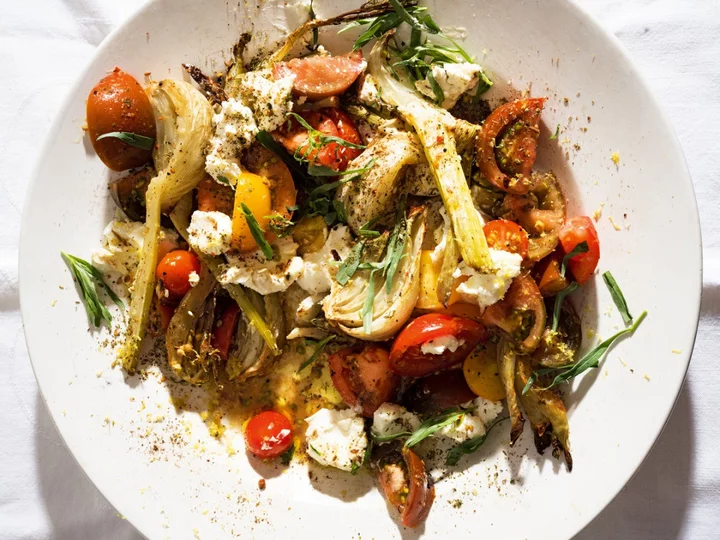
Splash out for this heritage tomato, fennel and dukkah salad
Make this in summer when the tomatoes are at their best,” suggests Imad Alarnab. “The better the tomato, the better this will taste, so splash out and get the good ones.” Heritage tomato, fennel and dukkah salad Serves: 2 as a main or 4 as a side Ingredients: 1 fennel bulb 2 tbsp olive oil 1 tsp za’atar 300g assorted heritage tomatoes, cut into chunks 2 tbsp good-quality extra virgin olive oil Grated zest and juice of ½ lemon 2 tbsp dukkah 150g soft goat’s cheese Small handful of fresh tarragon leaves Salt Method: 1. Preheat the oven to 200C/fan 180C/gas 6. 2. Cut the fennel bulb into 6-8 wedges, depending on how large your fennel is. Toss in the olive oil, za’atar and salt to taste, place on an oven tray and roast for 25-30 minutes until soft, slightly crisp and golden. Set aside to cool slightly. 3. Toss the tomatoes in a little salt and the extra virgin olive oil, lemon zest and juice, and dukkah. Roughly crumble the cheese and place on a large serving plate, followed by the roasted fennel and then the tomatoes. Finish with the tarragon leaves. Imad’s Syrian Kitchen by Imad Alarnab (HQ, £26). Read More The National Portrait Gallery’s new restaurant is fabulous upgrade The dish that defines me: Alex Outhwaite’s Vietnamese bun cha 3 TikTok-approved recipes for picnic season Imad Alarnab: In Calais’ Jungle refugee camp, food restored our faith It’s easier to make baklava at home than you might think Make this Middle Eastern lamb shoulder for your next Sunday roast
2023-07-19 21:19
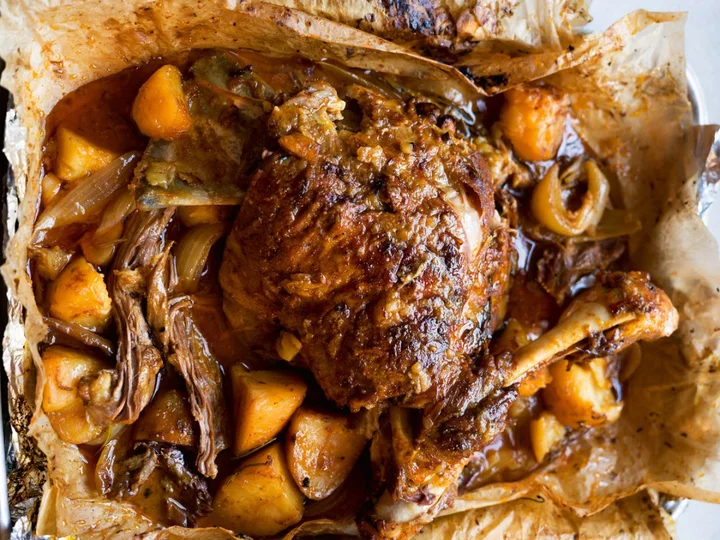
Make this Middle Eastern lamb shoulder for your next Sunday roast
A crowd-pleasing dish to serve up for a family meal or dinner party, Imad Alarnab’s Kataf Ghanam recipe hails from Syria. Kataf Ghanam (lamb shoulder) Serves: 4-6 Ingredients: For the marinade: 5 garlic cloves, grated 2 tbsp smoked paprika 1 tbsp mild Madras curry powder ½ tbsp ground black pepper 3cm piece of fresh ginger, grated 1 tbsp baharat (a spice mix blend) Juice of 1 lemon 1 tbsp tomato purée 2 tbsp red pepper paste Good pinch of salt 150ml olive oil For the lamb: 1.5-2kg lamb shoulder, bone in 10 garlic cloves, peeled 4 sprigs of thyme 4 sprigs of rosemary Method: 1. Mix together all the marinade ingredients in a large container. Rub the marinade all over the lamb so it’s completely covered. Cover and marinate in the fridge for a minimum of 4 hours, ideally overnight. 2. When you’re ready to cook, preheat the oven to 160C/fan 140C/ gas 3. 3. Take the lamb from the fridge, then get a high-sided oven tray and line with a layer of foil and a layer of baking paper, large enough to cover the lamb. Add the garlic and herb sprigs to the middle, followed by the lamb and all the marinade (you can also add onions, carrots or potatoes at this stage, if you like). Fold the foil and baking paper over the lamb like a parcel, then flip it over and wrap it again in another layer of foil so the lamb is tightly wrapped and there are no gaps. We want to cook the lamb in its own juices, so it’s really important that it’s completely covered at this stage. 4. Place in the oven and cook for 4 hours or until the meat is falling off the bone. Remove from the oven, unwrap, increase the temperature to 200C/fan 180C/gas 6 and roast until browned on top. Serve with kabsa rice or plain bulgur. ‘Imad’s Syrian Kitchen’ by Imad Alarnab (HQ, £26) Read More The National Portrait Gallery’s new restaurant is fabulous upgrade The dish that defines me: Alex Outhwaite’s Vietnamese bun cha 3 TikTok-approved recipes for picnic season Imad Alarnab: In Calais’ Jungle refugee camp, food restored our faith It’s easier to make baklava at home than you might think Get set for Wimbledon with top pastry chef’s strawberry recipes
2023-07-19 19:23
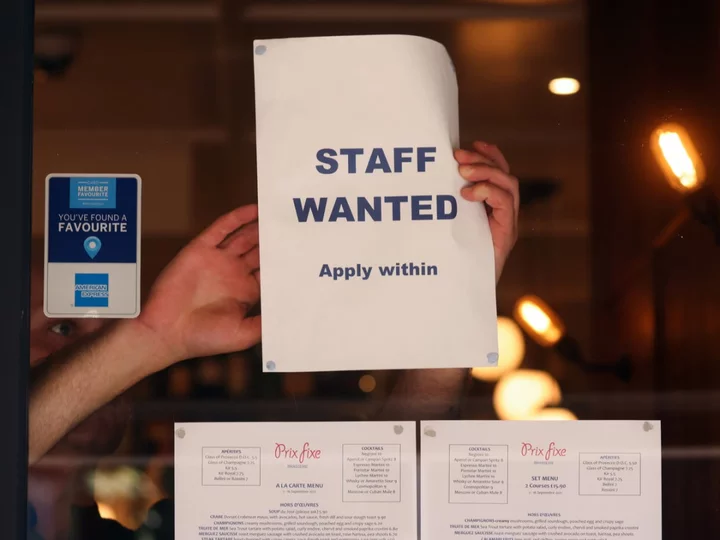
Between Brexit and Covid, London’s food scene has become a dog’s dinner – can it be saved?
London holds a special place in the hearts of food enthusiasts. In the halcyon days of the UK’s place in the European Union, it could even be said that the capital was one of the best cities in Europe – if not the best – for food. Despite it being beaten out by Paris in the Michelin guide (the French capital boasts 119 Michelin stars compared to London’s 74), the city’s sheer diversity made it stand out, with nearly every cuisine under the sun available somewhere in its streets. But recently it hasn’t really felt this way, and the people have noticed. Last week, Lily Allen tweeted: “Having been in New York for most of the time since Covid, I’ve spent long enough away to notice how far the standards have slipped in London’s restaurant scene… Delivery food and takeaways are even worse. Dunno if it’s Brexit or ghost kitchens or inflation or whatever, but it’s a terrible shame.” It’s evident from social media posts and online reviews that a lot of patrons feel the same. The restaurant industry has taken blow after blow in recent years, beginning with the UK’s messy divorce from the EU in 2016. And as it was trying to recover from Brexit, which resulted in increased costs, new bureaucracy and staff shortages, Covid hit. Restaurants were forced to shutter their doors for unknown periods of time, deal with confusing new rules, and magic whole new delivery systems out of thin air. Now, the industry is having to weather the cost of living crisis. In the face of all this, it might be a little cruel to denounce London’s usually thriving food landscape as “mediocre”. But, as painful as it might be, there is some truth to it. Ben Orpwood, a former contestant on the BBC reality series The Great British Menu, tells me that Allen’s observation, while perhaps a bit strongly worded, wasn’t completely wrong about the state of the industry. Orpwood, who was previously the executive chef at Gordon Ramsay’s Lucky Cat, has been cooking in some of the world’s finest kitchens for nearly two decades. But he says he’s never seen anything like the state of affairs at his latest opening, 20 Berkeley in Mayfair. “Normally when you first open a restaurant, the drop-off from the opening team [staff] is something like 20 per cent,” he explains. “You lose people who applied for something they’re not really ready for and opening week is very intense – so they go. But after we opened 20 Berkeley in June, apart from my core team, we had 100 per cent turnover. I’ve never seen anything like it.” He says that staff are leaving even with benefits like getting two meals a day, days and nights off, at least £13.50 an hour for employees with no prior experience, and a nice, conducive kitchen environment to work in – a far cry from the shouting and screaming he endured earlier in his career. “I had a pastry chef that left last week who worked 3pm-11pm, five days a week, no double shifts – he didn’t like how much work there was,” Orpwood marvels. “I can’t get my head around that mentality. The talent and the drive is just not there anymore, there are very few talented young chefs around and all the good restaurants are scrapping over them. When you’re going through that as a new restaurant, it makes it so much harder.” The chef, who has more than two decades of experience under his belt, explains that the aftermath of Brexit and Covid are primarily to blame. Brexit caused an exodus of EU citizens, many of whom questioned whether or not they were welcome in the UK. When Covid hit, more people returned to their home countries and discovered new work opportunities there, opting not to come back to British shores. “Then the government goes, ‘We’ll plug the shortage with young British workers’, except that they introduced needless academic requirements to apprenticeships with a minimum wage that people can’t pay their rent on,” Orpwood adds. The national minimum wage for apprentices aged 21 in their first year is £5.28 an hour, while the average rent for a room in London has rocketed to almost £1k a month. To say that we’re mediocre, I don’t really think it’s a fair reflection Ben Mulock Of course, some industry folk are more optimistic. Ben Mulock, executive chef of Balans, says: “The London food scene for me is still vibrant, it’s still innovative. We still have some great authenticity to it.” However, even the most positive outlook can’t ignore the biggest, most glaring problem restaurants currently face: the skills shortage. “I’ve been cooking since I was 14, and it’s never been like this throughout my entire career,” Mulock laments. “But we are striving and pushing our standards higher to try and give people the experience of years gone by with this new workforce. So, to say that we’re mediocre, I don’t really think it’s a fair reflection.” He adds that people who live in the capital have “some of the most discerning palates globally” and that feeding a London crowd “isn’t an easy thing to please”. “But when you get it right, it’s a wonderful, wonderful feeling,” he says. Perhaps, for anyone who lives outside of London, the bar has been set at an artificial high. Influencers invited to restaurants that have a marketing budget are more likely to post gushing reviews, complete with mouthwatering visuals as they stuff their gobs. Meanwhile, restaurant critics for broadsheets have been recently criticised for platforming establishments in more affluent areas, or only if they’ve been invited. Given some publications don’t pay for reviewers’ meals, this is unavoidable – but it generates a false economy in which readers believe those are the best places to eat. In his essay “London Finds Itself”, Vittles editor Jonathan Nunn wrote about the decline of reviews and the rise of simplified maps that pinpoint places to eat, which also manifests itself in lists. It’s why the algorithm adores those “10 stunning places to eat in London” videos, and why publications are desperate to churn out recommendation lists. He wrote: “The review is too discursive, too expensive to produce, written by people who demand to be paid properly. Far better to shop it all out to a freelancer who can google a bunch of stuff and stitch it together without context.” One has to wonder if this, too, has contributed to restaurants falling short of expectations – perhaps no one is looking closely enough. But Hugh Smithson-Wright, a communications specialist for restaurants, says that the food scene is no more mediocre than it’s ever been; in fact, there have always been plenty of middling eateries around. “Not everyone can be so great,” he says. “Some of my favourite restaurants have been places where food is absolutely fine.” But there’s a distinction to be made here. “Fine is OK if it’s not costing you a lot of money. Expensive is fine if the food is incredible. But now, with everything being so much more expensive for everyone on every income level, the places that are fine are getting more expensive, with smaller portions and cheaper produce, and that’s what we’re not tolerating.” Smithson-Wright points to the fate of Prezzo as a perfect example of this reduced level of tolerance. In April, the Italian restaurant chain closed 46 of its 143 branches and said it was due to soaring energy and food costs – but Smithson-Wright adds that its uninspired food was also a factor. “Prezzo was only fine – it wasn’t great or innovative, but as those prices go up, OK is not good enough. It’s these types of mid-range restaurants, whether chains or independent, that will find they have nowhere to go. They can’t suddenly make their food luxurious, and equally, they can’t suddenly charge the prices they perhaps need to be charging to keep the lights on.” Price is a painful topic right now, resulting in a bitter stand-off between some patrons and restaurateurs. But Britons have historically been averse to paying more for their food, lulled into a false sense of security by the cut-throat price war between supermarkets. Or a sense of: if I can spend less than £5 on a Sainsbury’s ready meal, why are restaurants charging three, four, or five times that for a main course? But, as Smithson-Wright points out, the “bravest thing a restaurant can do is charge what they need to” without fear of empty seats. “In some ways, restaurants punish themselves by not charging what they should and now they’re stuck in a mediocrity trap,” he says. “And they’re not helped by the psychological barrier people have over what they will pay for things.” So what does this mean for the future of food in London? The restaurant industry, as a whole, isn’t about to die any time soon. As Orpwood says, this is a resilient industry and will “just get on with it” until it comes out the other side with hopefully greener grass. Smithson-Wright adds that the current situation sounds a death knell for mid-level restaurants, many of which will not survive this period. But Mullock tries to offer a sunnier disposition. “The London food scene is alive and it’s doing some really good things. Everyone’s just pursuing deliciousness.” Read More Sorry lads, we just can’t afford any more reckless, middle-aged adventurers The dish that defines me: Alex Outhwaite’s Vietnamese bun cha Nappy changes and tantrums over Michael Gove: I took my one-year-old to a music festival Sunak rules out any new EU trade deal that undermines Brexit freedoms Tory MP broke rules over £150,000 loan from Russian businessman What is the future of the Conservative Party?
2023-07-19 13:52
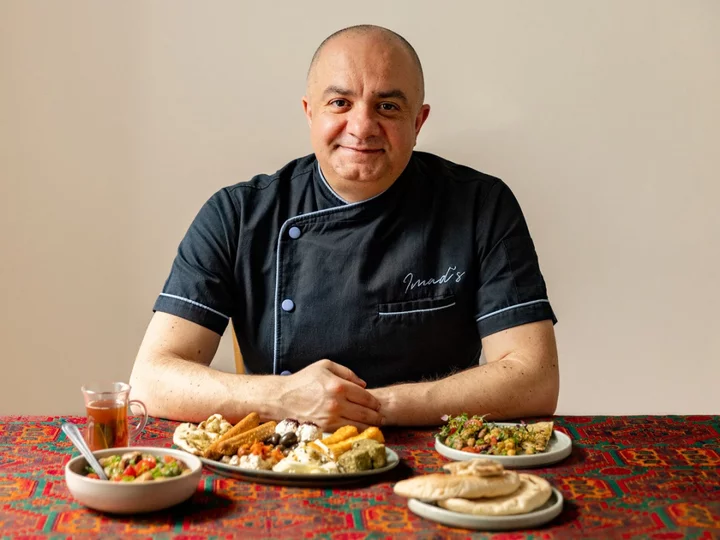
Imad Alarnab: In The Jungle, food restored our faith
Food can bring people comfort in the darkest times, and for Imad Alarnab, this time came when he was stranded as a refugee in Calais for more than two months. A hot plate had been donated, people collected leftovers from supermarkets, and having been a successful chef back in Damascus – with three restaurants, and a string of cafes and juice bars – Alarnab did what he did best, night after night, he cooked. “It was just something I felt like I needed to do, because you get to make a lot of people happy. Especially at that time, they needed something to be happy about,” says the 45-year-old, who would feed as many as 400 people at a time. The overcrowded camp that became known as The Jungle was close by, but Alarnab says it was too terrifying and overcrowded, so he and a group of several other Syrians slept on the steps of a church instead. And it was here he cooked the food of home – adapted, of course, depending on what they had. “To have a decent warm meal – for people whose lives have been on hold, they can’t cross to safety – was a big deal for all of us,” says the father-of-three. In fact, it was the first time he’d cooked for lots of people since all of his businesses were bombed within a week in 2012, in the country’s civil war, and this was the moment hope returned. “I think it restored all of the faith that things could, and would, get better,” Alarnab writes in his debut cookbook, Imad’s Syrian Kitchen. By July 2015, he’d made the painful decision to leave his wife and three daughters in Damascus to make the treacherous journey via Lebanon, Greece and North Macedonia, to the UK, where they had relatives. With his children too young to make the journey, the family planned to join once he’d been granted asylum. “If I had any other choice, I would have definitely taken it. [Fleeing] wasn’t the easiest but it was somehow the safest,” he says. “When I was in Syria during the war, people were saying, ‘It’s not safe to go out of the house because maybe you’re going to die’. But I needed to feed my family, if I stayed in the house they would die from hunger. There’s no good choice or bad choice, but maybe it’s the only one you can make. “When I was leaving Damascus, my oldest daughter made me promise I would see her within one year. I said, ‘Yes, I promise,’ but I wasn’t really sure if I was going to keep that promise or not.” And during the three months before he reached the UK – walking hundreds of miles on foot, on train, in the back of cars, on push bike, at the mercy of smugglers, with false IDs and the kindness of strangers – there were moments of doubt, like when he was crammed in the back of a lorry in Turkey for seven hours. “There were about 95 of us, I felt it was a stupid decision, risking my life so much. I believe the driver was so scared, or maybe drunk – the speed was absolutely scary. I thought we were not going to make it.” His journey ended eventually by using a fake passport to cross the Channel in October 2015 (the moving, often harrowing, story is weaved through his new cookbook), and first finding work illegally in a car wash, where he also slept as an overnight security guard, sending money home. After his family were able to emigrate (just under the year he’d promised his daughter) someone introduced him to the Cook For Syria scheme – and soon he was hosting super clubs at his house. By May 2021, he’d opened his London restaurant, Imad’s Syrian Kitchen. His first cookbook is a combination of dishes served up at the restaurant and his late mother’s recipes. “Almost every single dish is somehow related to my mother – I keep seeking her approval in everything I do in life, but especially with cooking,” he says. It was his mum, Summer, who first taught him to cook. “Even if you create your own recipes, somehow you will [always] be inspired by your first teacher”. She died very suddenly while Alarnab was living alone in a caravan in west London. Syrian food at its heart is “simple, first of all, and affordable for everyone”, he says. “We use a lot of mild spices, not very hot spices.” They’re mostly things you’ll know; “cumin, mint, garlic, nothing really special about it. [but] you put it together in a special way”. Middle Eastern in identity, much of it might feel familiar; tabbouleh, hummus, baklawa; while traditional dishes include buttered halibut, jaj bailfurn (grilled chicken thighs) and kippeh (lamb and bulgur wheat dumplings). Lunch is typically a feast of many dishes. “We’re a family of five and we never ever have one dish for lunch,” says Alarnab. “And we don’t throw anything away.” Before the war – which began as an uprising against President Bashar al-Assad in 2011 but has since involved a complex number of groups fighting one another, including so-called Islamic State, leaving at least 11 million people displaced – Alarnab was one of the lucky ones, he says. “We had a comfortable life, but most people in Syria were suffering. When you have a dictatorship for more than 50 years, of course people will be suffering. You cannot explain life without freedom to someone who’s lived all of their life with it. “People keep asking me silly questions – ‘Why did you have to go to 10 different countries to come to the UK? You could just get a plane ticket straight from Lebanon to Heathrow’. No, it doesn’t work like that. As a Syrian, my passport takes me to three countries – war zone countries. Even if I wanted to go to every country supporting Assad, I’d still need a visa.” Once the fighting started, food, that once brought him so much joy, lost all meaning. “I don’t know how to describe it, but the food tasted like blood. I know it’s disgusting, but nothing tasted the same. When you live in fear for your family, when your daughters are not safe to go to school, food will taste [bad], nothing can make you happy.” Cooking Syrian food now makes him feel “connected” to his home country, of course, “but it also makes me feel part of this unique community in the UK”. Arriving in London, he says: “I felt safe, I felt ‘I can be different, I can be myself, no one cares’. Everyone’s so different, it makes all of us lookalike.” Even after starting from scratch in a new country after losing everything, with a highly-acclaimed restaurant and now a cookbook, he’s most proud of his daughters. His eldest is studying at Warwick University after gaining straight As, his middle child is a talented artist. “The youngest [13] is the naughty one still,” he laughs. “But you can feel they appreciate their life – they are so happy about it.” ‘Imad’s Syrian Kitchen’ by Imad Alarnab (HQ; £26). Read More The National Portrait Gallery’s new restaurant is fabulous upgrade The dish that defines me: Alex Outhwaite’s Vietnamese bun cha 3 TikTok-approved recipes for picnic season It’s easier to make baklava at home than you might think Get set for Wimbledon with top pastry chef’s strawberry recipes Pinch of Nom: Healthy eating doesn’t have to cost the earth
2023-07-19 13:51
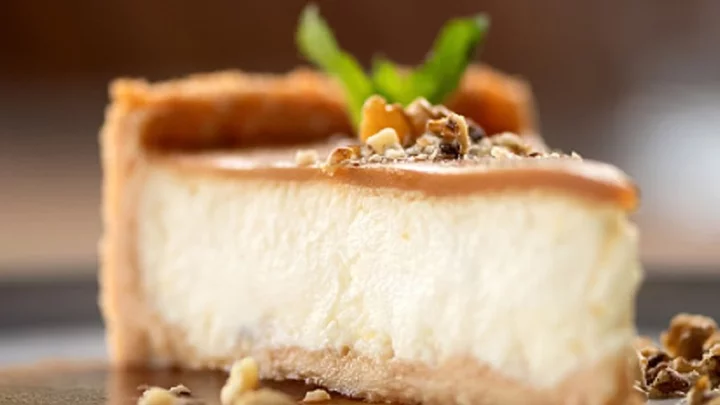
The Indian cheesecake secrets found in a 1904 book
The 120-year-old recipes are a far cry from the cheesecakes we are familiar with today.
2023-07-19 06:48
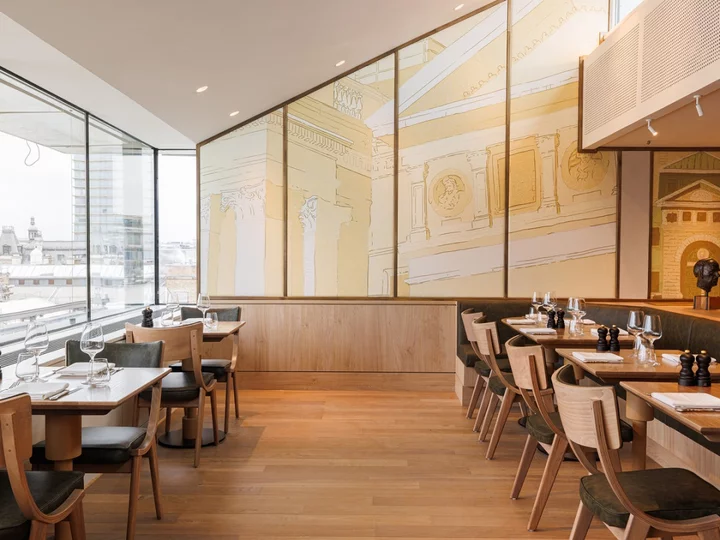
The National Portrait Gallery’s new restaurant is a fabulous upgrade
It’s possible that you’ve never paid much attention to London’s gallery and museum restaurants, but once you start looking for them, there are many. The British Museum’s Great Court Restaurant, under its iconic glass ceiling; Skye Gyngell’s temple to veg, Spring, at Somerset House; high-end tapas at José Pizarro at the Royal Academy of Arts. They’re not the edgiest joints in town, nor somewhere you’d drop in for an impromptu bite. Instead, what they’re great for is a gift – an art fix and a posh lunch or dinner as a day out. I have such a food-and-art pairing in mind when I take my dad to The Portrait, the new Richard Corrigan restaurant at the National Portrait Gallery. Tucked at the top of the Trafalgar Square building, in a former glass-edged event space where windows are filled with a pleasing cityscape of London rooftops, it opened on 5 July, the final touch to a major three-year renovation of the gallery that finished in June. It’s open for lunch Sunday to Tuesday, and both lunch and dinner Wednesday to Saturday. The Portrait also opened just days after the launch, to much fanfare, of Sir Paul McCartney’s NPG exhibition Eyes of the Storm. A behind-the-scenes look at The Beatles’ dizzying rise to fame in 1963 and ’64, followed by fine dining, sounds right up mine and my dad’s street – a classic central London day out. The NPG has certainly had a glow-up since I last visited. A polished new entrance hall and welcome desk, gliding escalators, vividly painted galleries and rehung portraits. After marvelling at McCartney’s handwritten lyrics to I Wanna Hold Your Hand, and the youthful ease and joy of an off-duty John Lennon frolicking in Miami, we drop in on the Tudors before heading up to The Portrait. It’s a rather corporate-feeling but convivial scene, with linen-trousered and pastel-shirted guests talking art over elegant plates of fish and meat, gleaming glassware and white napkins. What jazzes up the simple pine tables and steel-framed open kitchen is the view: a long, slim panorama featuring the National Gallery’s ornate dome, the London Eye, Nelson’s Column, the Houses of Parliament and the tower of St-Martin-in-the-Fields. Along one sloping wall is a butter-yellow mural of the gallery’s exterior, which marketing materials tell me are bespoke linen panels by wallpaper-maker-to-the-stars de Gournay – but otherwise the Brady Williams Studio has kept the design light and minimal, letting the view, and the food, do the talking. Here’s what it has to say: instantly intriguing things about artichoke with crab mayonnaise and kombu (kelp seaweed powder), “snails bolognaise” over conchigliette, a duck heart vol au vent, pig’s trotter with borlotti beans and something described only as “cauliflower, yeast, seeds”. (We skip that one.) Much of it is what you’d expect from Corrigan – earthy flavours from the UK and Ireland, plenty of fish and veg present, but with a few curiosities thrown in. We kick off with Carlingford oysters zinged up with ginger, lime and coriander – “This is no stuffy seafood restaurant”, they clearly declare. My dad is presented with his artichoke starter, a glorious fan of outer petals cupping a nicely roasted centre, topped with a crab-rich seafood sauce and umami-packed powder. Both are light, flavour-packed and made for a champagne toast. Next we dig into that escargots bolognese, and pork with barigoule of fennel and apricot mustard. The bolognese is rich and nicely seasoned with a pleasantly meaty texture, but the pasta shells fall slightly flat with a fairly bland, creamy sauce; I long for a more moreish dish where the pasta enhances rather than simply supports the bolognese. The Huntsham’s Farm pork wins more points with its melting richness, set off by the vinegary tang of the fennel and peppery-fruity sauce. Our friendly and approachable waiter talks through some wine-by-the-glass options for us, picking out a refreshing Sauvignon Blanc and a Chianti to suit our respective dishes. Service is quick and efficient, but with no trace of being rushed through and out – there’s plenty of time to linger and talk over the view. Which we do for well over an hour and a half, given we can hear each other clearly (always a bonus for a dad and daughter meet-up). Unusually for both of us, we indulge in a pudding: I can’t resist the English cherries with goat’s milk ice cream, a fabulous clash of jammy sweetness and savoury tartness. Dad goes for the rum baba, soaked in a generous boozy sauce with enough fresh pineapple to cut through the sweetness. Like our choices of sides – olive oil mash and broccolini with almonds – everything is instantly appealing while having some sort of flourish we may not have had before. When I thought of a gallery lunch, I pictured perfectly fine fish fillets and chicken cutlets, rather than my first snail pasta dish, my first goat’s milk ice cream and my first Asian-spiced oyster all in one sitting. With dainty-portioned mains at £22-£32, there are no bargain bites, but the style of food and the option of set menus (£28 for two courses, £35 for three) feels nicely suited to an exhibition ticket as a present or treat. You could easily jazz up that £28 prix fixe with a £15 glass of champagne or The Portrait’s strawberry and balsamic bellini. A meal here can be as good value and restrained or lavish and decadent as you make it – surely true of any day out in the capital. And with most of the National Portrait Gallery free to view (not to mention freshened up, with the visitor experience streamlined) it’s a fabulous upgrade for a low-key afternoon of art. The Portrait Restaurant, The National Portrait Gallery, St Martin’s Place, London WC2H 0HE | 020 3872 7610 | theportraitrestaurant.com Read More The Union Rye, review: Finally, a decent restaurant in this charming East Sussex town Forest Side: Heavenly Cumbrian produce elevated to Michelin-starred proportions Papi: Pandemic troublemakers’ restaurant is a fun, flirty hit The dish that defines me: Alex Outhwaite’s Vietnamese bun cha 3 TikTok-approved recipes for picnic season It’s easier to make baklava at home than you might think
2023-07-18 19:49

Tom Kerridge addresses backlash to his £35 fish and chips at Harrods: ‘They shout at me’
Tom Kerridge has defended charging £35 for fish and chips in luxury department store Harrods, explaining the quality of the ingredients and labour that go into the dish. The celebrity chef, 49, came under fire earlier this year for the costly dish at Kerridge’s Fish and Chips, which comprises of line-caught turbot and hand-cut potato chips. Some angry customers called the portion of fish “scrawny”, while others criticised the “thimbles of sauce” that accompanied the dish. But the Michelin-starred Kerridge – who has dealt with criticism of his prices in the past, including for an £87 sirloin steak in his Buckinghamshire pub – detailed the difference between his dish and a regular chippy’s fish and chips. Speaking to the Radio Times, Kerridge said that the backlash no longer affects him and he’s “learnt to deal with it”. “I’m seen as a man of the people, so when I put fish and chips on for £35, they shout at me for it being expensive,” he said. “But the people criticising me don’t understand how it’s priced. Fish and chips was always seen as cheap, fast food, and I get that because of where I grew up.” Kerridge went on to explain the supply chain behind a portion of fish and chips, saying: “The fish in most chippies is frozen at sea, in a big block, a year ago, then cut up and portioned. “The potatoes are maybe four weeks old, have gone through a chipper, been cleaned and put into cheap oil. They’re wrapped in paper, with malt vinegar and salt.” Kerridge clarified that he does “love” regular fish and chips, but that the dish he serves in Harrods is different. “At Harrods, it’s line-caught, day-boat turbot,” the Great British Menu judge said, referring to fish that is caught using traditional fishing methods by fishermen who go out to sea and return on the same day. “The potatoes are specifically sourced for their sugar and starch content, then individually cut up by a person. It’s bespoke dining in the most exclusive and beautiful shop in the world. Of course it’s expensive,” he added. In 2021, Kerridge defended the prices at his pub, arguing that they “include everything, VAT and service”. “No additional service charge at all. Also I pay staff properly and treat their job as a professional career. Perhaps the real cost of dining should be addressed,” he tweeted in response to a critic. “Unpretentious does not mean cheap. Also, why is profit a bad word?” Kerridge opened his first pub, The Hand and Flowers, alongside his wife Beth in 2005. Within a year, he had gained his first Michelin star. Since then, the TV personality has been given three Michelin stars, including a second for The Hand and Flowers, and the third for The Coach. He has appeared on numerous TV programmes such as MasterChef and Saturday Kitchen, and currently presents Food and Drink for BBC Two. Read More Sorry lads, we just can’t afford any more reckless, middle-aged adventurers Cruise line apologises after passengers witness dozens of pilot whales being slaughtered Delia Smith denounces vegan diets as ‘wrong’: ‘Don’t say you’re helping the planet’ 3 TikTok-approved recipes for picnic season Fans swoon over Stanley Tucci cooking dinner for Robert Downey Jr at ‘Casa Tucci’ The dish that defines me: Alex Outhwaite’s Vietnamese bun cha
2023-07-18 18:16
